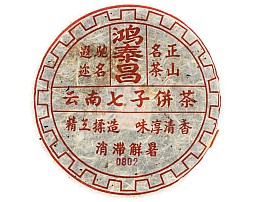2006 Hong Tai Chang 0803 Raw Pu-erh Tea Cake
Old raw (sheng) pu-erh tea from the Thai factory that produces pu-erhs under the name Hong Tai Chang.
The tea is made by a Chinese master, a native of Yunnan. He has been making Pu-erhs for more than 40 years. Then he’s been retired and passed on all his knowledge and experience in producing and storing pu-erhs to his disciple, whom we’re working now with.
The material of 200-700-year-old tea trees, the harvest of 2006. Province of Chiang Mai, northern Thailand, 1300 meters.
The dry tea smells with bark, dried fruits, spices. In the taste, there are various dried fruits: raisins, dried apricots, plums. Light smoky flavor reminds of some Chinese raw puers and makes dried fruits taste more like prunes. There are some savory wood tones and spices.
The tea possesses powerful energy that relaxes. It can hold you in calm concentration for a quite long while.
Reviews (9)
This has to be the best value for price tea I have had. If it were to be sold as tea from Xishuangbanna, it'd cost four times as much.
It's got musty cedar, leather, wood, tobacco and oxidised apples from the wet leaves, which also go into the flavour profile. It's surprising how subtle and ethereal the tea is, with a strong spicy-woody-dates taste that transforms into fruity and even some florals. Also strong camphor cooling. The endurance is pretty good with 15 steeps, brewed with a firm hand. Very active mouthfeel, with watery texture all the way. The cha qi crept in slowly. It gives a strong body feeling in the stomach, chest and upper legs, with a relaxing mental space on the strong side as well that lasted all day.
Definitely a staple of what semiaged old tea tree should be! Glad that I blind-bought a cake :)
7.8 grams leaf in 118 ml unglazed Duchek teapot. Water just off the boil, flash brews. Just-opened cake looked funky but beautiful and healthy, mostly a deep and rich brown. Smelled like very old baled hay. Nice compression - broke apart easily-enough with both hands and knife. The fragrance from the warmed dry leaf was of faint old tobacco, musty cedar closet. Rinse brewed out deep and rich golden brown, beautiful and almost clear. Faint tar and blackberries the smell from the brewed warm leaves in the teapot. Weak sweet taste from a little sip of the rinse just out of curiosity before the tea took off and me with it. Gorgeous broth, woody rough/sweet taste, thickish and mostly wet, sometimes juicy, always sumptuous and delicious all the way until I had to stop.
Brief (5-10 seconds) steeps in 90 Celsius water.
Liquor has an almost-clear golden caramel color.
Taste has a woody note with a somewhat sweet aftertaste that is not fruity nor floral, but more earthy.
Mouthfeel is slightly sticky, with a touch of astringency.
Wet leaves are dark brown in look, giving off a spiced woody aroma.
The flavor intensity starts to mellow down by the 5th/6th infusion, thus best to steep longer from here onwards.
A longer (1-minute) infusion doesn't give that much of a difference in flavor intensity apart from some dryness on the palate.
Tea has changed over two years, in my opinion. It has become much more restrained, softer and lighter. I do not think that you can say unequivocally about these changes are positive or not - it's a matter of taste. I give it 5 stars, because I definitely like this tea. The aroma is quite bright, harsh, fruity with hints of leather and wood, reminded me of the Banzhang Sheng of the same years. The infusion is light, clean, with a slight tartness, turning into sweetness. On the palate the same dried fruit, leather, woodiness, perhaps a hint of spices, medicinal herbs. The combination of tones creates a picture of a heavy, aged tea, which is interestingly perceived in combination with the lightness of the infusion. The chi is explicit, meditative, the tea warms me well, and can set me up for both contemplation and focus on some work. I will be happy to return to it. Thank you!
I like it wildly in taste and effect, and I also think it's easy to brew, it never brewed bad at all. It's my favorite of the TEASIDE line. I don't drink it in a vanity. SAVING.








